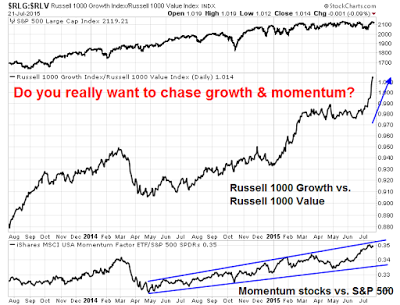by Cam Hui, Humble Student of the Markets
The WSJ recently published a story about how money managers were piling into growth stocks because of the scarcity of growth:
[M]any fund managers say they are buying tech shares now. Valuations are a fraction of what they were before the crash in 2000, and top technology firms appear to be building world-class franchises that could generate large profits for years to come, analysts and investors said.And though the U.S. economy continues to expand, sales and earnings in many sectors of the economy are flat or falling, highlighting the relative promise of the technology sector.
“Growth is really scarce right now,” said Josh Spencer, portfolio manager of the T. Rowe Price Global Technology Fund, which manages more than $2 billion. Google is one of the fund’s top holdings. “The reality is that global GDP is just not that exciting. You really get a premium if you can show organic growth,” or rising revenue excluding acquisitions.
It really is different this time. (Yeah, right.)
“What’s different this time around is we’re seeing sustainable growth and real profits in a lot of cases,” said Dan Fletcher, research analyst on Neuberger Berman’s Large Cap Disciplined Growth team. He said the stock prices of large technology firms generally aren’t worrisomely high, but some unprofitable smaller companies have become very expensive.
Paradigm shifts, or wild claims?
One of the most dangerous comments in investing is, ”It really is different this time”. Izabella Kaminska of FT Alphaville was somewhat skeptical of the all the paradigm-shifting cheerleading for technology at her personal blog Izzynomics:
I’m increasingly coming across a whole generation of smart young minds who are convinced that “this time is different” and that free information/connectivity can not only save the day but that things like fintech can literally cure poverty and cancer…
I’m biting back. I’m biting back because I worry that this line of thinking is only going to create a whole bunch of suckers who are going to be scammed. Technology does have the potential to save the day. But technology alone will not be responsible for this.
As an aside, see this account of the comments from Andy Lo of MIT about how financial engineering can cure cancer. Kaminska went on to describe her reservations about the application of fintech to developing economies:
What bothers me about “fintech” in particular is that it assumes digitisation alone can help influence behavioural shifts. But really there only two ways that fintech can bring affluence to developing markets.
1) if it can enforce behavioural changes by better rationing access to consumption goods than the current system — mostly by way of algorithmic judgments. (Something that I’m actually not convinced it can do, because: endogenous money, theft, black market etc etc)
2) By anticipating your wants and needs through mass surveillance and data capture, and then manipulating them if they don’t fit the resources to hand, to the point you’re not really free at all.
For a different perspective, Tom Bradley of Steadyhand Funds also expressed reservations about an over reliance on advertising revenue by many tech companies [emphasis added]:
Have you noticed how many new age companies are dependent on advertising for their revenue? What leading growth company isn't counting on ads to make their business model work?
The powerful tech and social media companies like Google (including YouTube), Facebook (Instagram) and Twitter generate most of their revenues from advertising, and we read every day about new companies that have built an app, website or game to deliver advertising.
The disconnect? Are there enough advertising dollars to support the established mediums (television, radio, newspapers, banner ads, billboards, sports sponsorships) and justify the valuations of the newcomers?
It seems almost certain that the conventional media will continue to lose market share. Dollars currently being spent on newspapers like The Globe and Mail or "The News at Six" will be re-allocated to shared photos, a tweet and Grand Theft Auto 22.
And if the new providers can improve advertising effectiveness through enhanced analytics and precise targeting – i.e. deliver more revenue per advertising dollar – it makes sense that the advertising pie will grow substantially. If Molson and McCain Foods get more bang for their buck, they’ll spend more bucks.
But it seems to me, from an investment perspective, something has to give. The advertising pot is finite. Either conventional media will disappear more quickly than expected, or the total capitalization of the new media players will go through a correction. I'm betting on both.
Investors should heed his conclusion:
How inconsistencies in the market resolve themselves can have a profound impact on future investment returns. If you believe they're unsustainable, then you need to understand how they will eventually re-connect.
Growth and momentum stocks look extended
Even if we were to set aside the unfriendly market reception to the earnings reports of AAPL, MSFT and YHOO, the chart below shows that growth and momentum stocks appear to be extended. The middle panel is the relative performance of the Russell 1000 Growth Index vs. the Russell 1000 Value Index. This ratio has gone straight up in the past few days. Even if you are bullish on growth stocks, do you want to be chasing them here? The bottom panel shows the relative performance of the momentum stock ETF (MTUM) relative to SPY. MTUM is in a relative uptrend but also appears extended when compared to the market.
From a fundamental and technical perspective, do you really want to be chasing the glamour growth stocks right now?
Copyright © Cam Hui, Humble Student of the Markets













